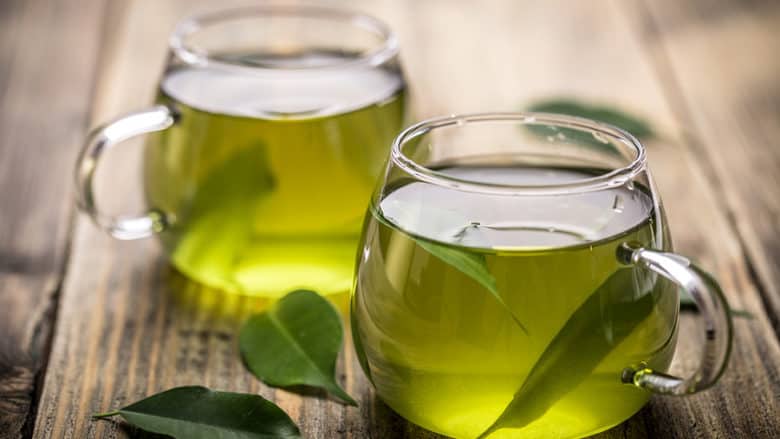
Green tea side effects can happen, especially when taken as an extract or in high doses (more than 5 cups a day).
Green tea benefits make it a natural healing herb that’s wise to include in your list of healthy foods.
Western science finds it may help prevent and treat diseases like cancer, gum disease, Parkinson’s, stroke, and heart disease making it a good choice for natural healing.
Yet, too much of a good thing can harm you. So, let’s look at what experts at MedlinePlus, a service of the National Library of Medicine and National Institutes of Health, have to say about green tea side effects and precautions.
What Experts Say
They say that drinking green tea is likely safe for most adults, although stomach upset and constipation can occur for some. It is possibly safe for children in amounts commonly found in foods.
Green tea extract (a concentrated form) is possibly safe with short-term use, although liver problems have been reported in rare cases.
Green tea is possibly unsafe when you drink more than 5 cups a day; take green tea extract over long periods; or when taken with certain drugs and herbs. Drinking green tea in very high doses (10-14 grams or 150-200 mg per kilogram) can even be fatal.
It is possibly safe in small amounts if you are pregnant or breast feeding. Drinking more that 2 cups of green tea a day (provides about 200 mg of caffeine) has been linked to an increased risk of miscarriage.
Caffeine can also pass into breast milk to affect the nursing infant.
Side Effects
Green tea side effects mostly occur from its caffeine content. Caffeine has many effects on the body’s metabolism, including stimulating the central nervous system. This can make you more alert and give you a boost of energy.
However, too much caffeine may result in headache, nervousness, sleep problems, vomiting, diarrhea, irritability, irregular heartbeat, tremor, heartburn, dizziness, ringing in the ears, convulsions, and confusion.
Use green tea with caution with these health concerns:
- Anxiety. Caffeine may worsen anxiety.
- High Blood Pressure. Caffeine may increase blood pressure in those with high blood pressure. However, this doesn’t seem to occur in people who regularly drink green tea or other substances that contain caffeine.
- Bleeding Disorders. Green tea may increase the risk of bleeding in those with a bleeding disorder.
- Diabetes. Green tea might affect blood sugar control so monitor blood sugar closely.
- Glaucoma. If you have glaucoma, its best to avoid green tea as it increases pressure inside the eye.
- Weak Bones (Osteoporosis). Drinking more that 3-cups a day may flush out calcium from your body due to caffeine’s diuretic effect. You can take calcium to make up for this loss, though.
- Anemia or Low Iron. Green tea may make anemia worse and might reduce the absorption of iron. If you are low in iron, drink green tea between meals.
- Low Folic Acid. There is some concern that green tea might decrease the activity of folic acid, leaving the body with less than it needs.
- Heart Conditions. Caffeine may cause irregular heartbeats.
Precautions
Green tea extract might increase the risk of liver damage when taken with drugs and herbs that can harm the liver, like these:
- Acetaminophen (Tylenol)
- Simvastatin (Zocor)
- Phenytoin (Dilantin)
- Erythromycin (Erythrocin, Iosone, and others)
- Amiodarone (Cordarone)
- Carbamazepine (Tegretol)
- Isoniazid (INH)
- Methotrexate (Rheumatrex)
- Bishop’s weed
- Borage
- Chaparral
- Uva ursi
- And many others
The caffeine in green tea may increase the side effects of stimulant drugs and herbs like these:
- Ephedrine
- Cocaine
- Nicotine
- Phenylpropanolamine
- Theophylline
- Asthma medications (beta-adrenergic agonists)
- Ephedra (Ma Huang)
Some medications (like antibiotics, birth control pills, cimetadine, antabuse, estrogens, and others) decrease how quickly your body breaks down caffeine, thus increasing caffeine side effects.
Taking green tea with medications that slow clotting might increase the chances of bruising and bleeding.
Caffeine can also affect how your body uses some drugs (like lithium, cancer drugs, dipyridamole, Phenobarbital, and others).
If on medications, check with your healthcare provider before taking green tea extract or drinking more than 3-cups a day.
Further, some say that adding milk to tea may decrease some of green tea’s benefits for heart and blood vessels, but this is controversial.
Key Points
Green tea side effects can happen, especially when taken as an extract or in high doses (more than 5 cups a day).
It also has many benefits that make it a wise choice. Use this list of side effects and precautions to guide you in deciding if green tea is right for you.
